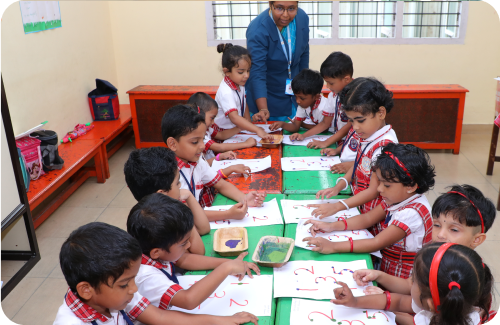Home > Kindergarten
Our program harnesses children’s innate curiosity to create joyful, hands-on, and self-paced learning experiences. By supporting natural development, we empower students to build essential capacities for a fulfilling adult life. In our pre-primary course, we ignite young minds, allowing them to explore their interests and develop a strong foundation in various aspects of life, from academics to leadership. We emphasize holistic development, preparing children for a smooth transition to a more formal primary curriculum. Language, sensorial, mathematical, and cultural activities enrich their learning journey.

All children are innately interested in learning about the world around them through their natural curiosity which the program helps them develop and grow. We promote hands on, self-paced, collaborative and most importantly, joyful learning. By providing an environment that supports natural development, This education enables children to develop the fundamental capacities that they need, to become happy and fulfilled adults who contribute in meaningful ways to society.
The pre-primary course enables us to ignite and awaken a child’s mind to the wonders of the universe and to help them better understand and know their role in it. Children follow their interests to wherever that passion leads, thus giving them a strong foundation in their development – be it in academics, leadership, self-discipline, responsibility, independence or initiative and thus, instills in them, a lifelong love for learning.The emphasis is on exploring, knowing, understanding and forming their own ideas. The principles of learning applied in Kindergarten include Holistic Development and Learning (Aesthetics and Creative Expression, Language and Literacy, Numeracy, Self and Social Awareness); Integrated Learning; Active Learning; Supportive Learning; Interactive Learning and Learning through Play. The curriculum prepares children for a smooth transition to a more formal Primary curriculum.
Language activities are designed to start developing a child’s reading and spoken skills.
Singing, rhyming and reciting are some strategies employed in the Language Arts and the Phonics Programme. Activity areas or learning centres are set up in the classroom, with resources that actively engage children to learn about particular themes or topics.
In language, we introduce the child to the sounds of letters by using a multi-sensorial approach with objects, pictures and matching games. Once sounds can be isolated, the children are then ready to blend sounds together to start reading small words. The approach to language development is respectful to each child’s individual needs and desire to absorb verbal, written and reading skills.
Sensorial activities are designed to educate and refine a child’s senses of sight, touch, taste, smell and hearing.
The materials in this area help a child to recognize similarities and differences between colour, size, shape, weight, texture and more. Refinement of the senses develops critical thinking, concentration and sequencing, which in-turn, serve as the building blocks for math, reading and writing.
Mathematics activities are designed to develop the child’s numerate skills. The study of Mathematics starts in the EPL and Sensorial areas. Children are indirectly preparing for math as they discover similarities, compare differences, find sequences, sort items and complete cycles of activities. Further, specifically designed math materials are also presented in a visual and tactile manner, allowing children to see and hold in their hands specific quantities. As a child is ready, more advanced and abstract concepts of mathematics are available to be explored.
Games, songs, creative projects, story-telling, role-play, drawing, and painting help develop children’s foundational skills in literacy and numeracy.
At Sri sai vidya vihar, this course of study is pursued through the discovery of classical subject areas.In addition to this, our children understand their role in the world today and the challenges that they will have to cope with as they become adults.
Embedded in our curriculum is also an important facet of a child’s development in Cultural Studies. It is now even more imperative that our children be equipped with the skills to think critically, to be able to analyse and problem solve, to be able to research, to communicate and collaborate effectively.
Simple everyday tasks have complex aims: to develop order, concentration, coordination and independence. Mastering these tasks play a critical role in future intellectual growth and helping children learn through well-defined everyday activities lies at the heart of learning.
Everyday life skills, social graces and movement are taught through interesting and fun activities such as pouring, spooning, tweezing and sorting. These tasks help develop eye-hand coordination and small muscle control, which is the foundation for writing and other, more complex activities. Gaining an awareness and responsibility for their environment is taught through activities such as cleaning, watering plants, returning materials to their original location and moving around the environment courteously.
